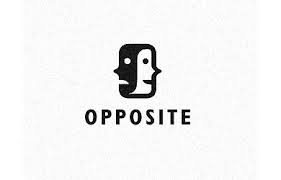opposite
英 [ˈɒp.ə.zɪt]
美 [ˈɑː.pə.zɪt]
- adj. 相反的;对面的;对立的
- n. 对立面;反义词
- prep. 在…的对面
- adv. 在对面
使用频率:

记忆方法
1. op- "against" + posit- + -e.
2. literally "set against, set opposite". => oppose, object to.
3. => standing against, placed on the other side of (something), contrary in nature or character.
2. literally "set against, set opposite". => oppose, object to.
3. => standing against, placed on the other side of (something), contrary in nature or character.
中文词源
opposite 相反的,对立的
来自oppose,反对,-ite,形容词后缀。即反对的,对立的。
英语词源
- opposite (adj.)
- late 14c., "placed on the other side of (something)," from Old French oposite "opposite, contrary" (13c.), from Latin oppositus "standing against, opposed, opposite," past participle of opponere "set against" (see opponent). Meaning "contrary in nature or character" is from 1570s. As a noun from late 14c. As a preposition from 1758. As an adverb from 1817. Related: Oppositely.
权威例句
- 1. The argument contained herein takes exactly the opposite point of view.
- 本文所持的论点恰恰是站在相反的立场。
- 2. A string of five rowing boats set out from the opposite bank.
- 5只划艇排成一行从对岸出发了。
- 3. The two politicians represent opposite poles of the political spectrum.
- 这两位从政者代表了政界的两个极端。
- 4. St Andrews was ten miles in the opposite direction.
- 圣安德鲁斯在相反方向上10英里处。
- 5. Neighbours approached their boundaries from opposite sides and made merry together.
- 邻居们从对面来到他们这边,一起尽情欢乐。
